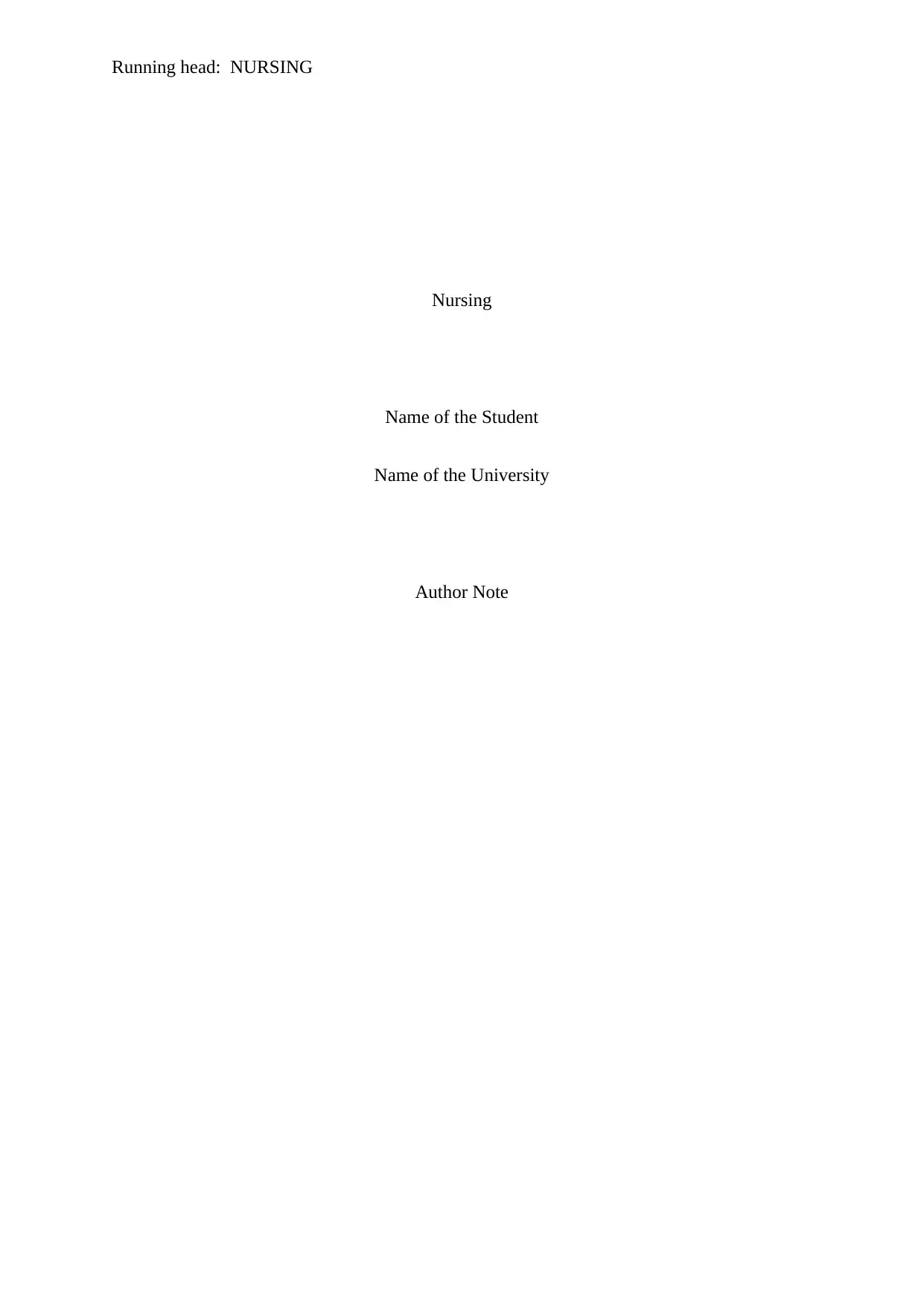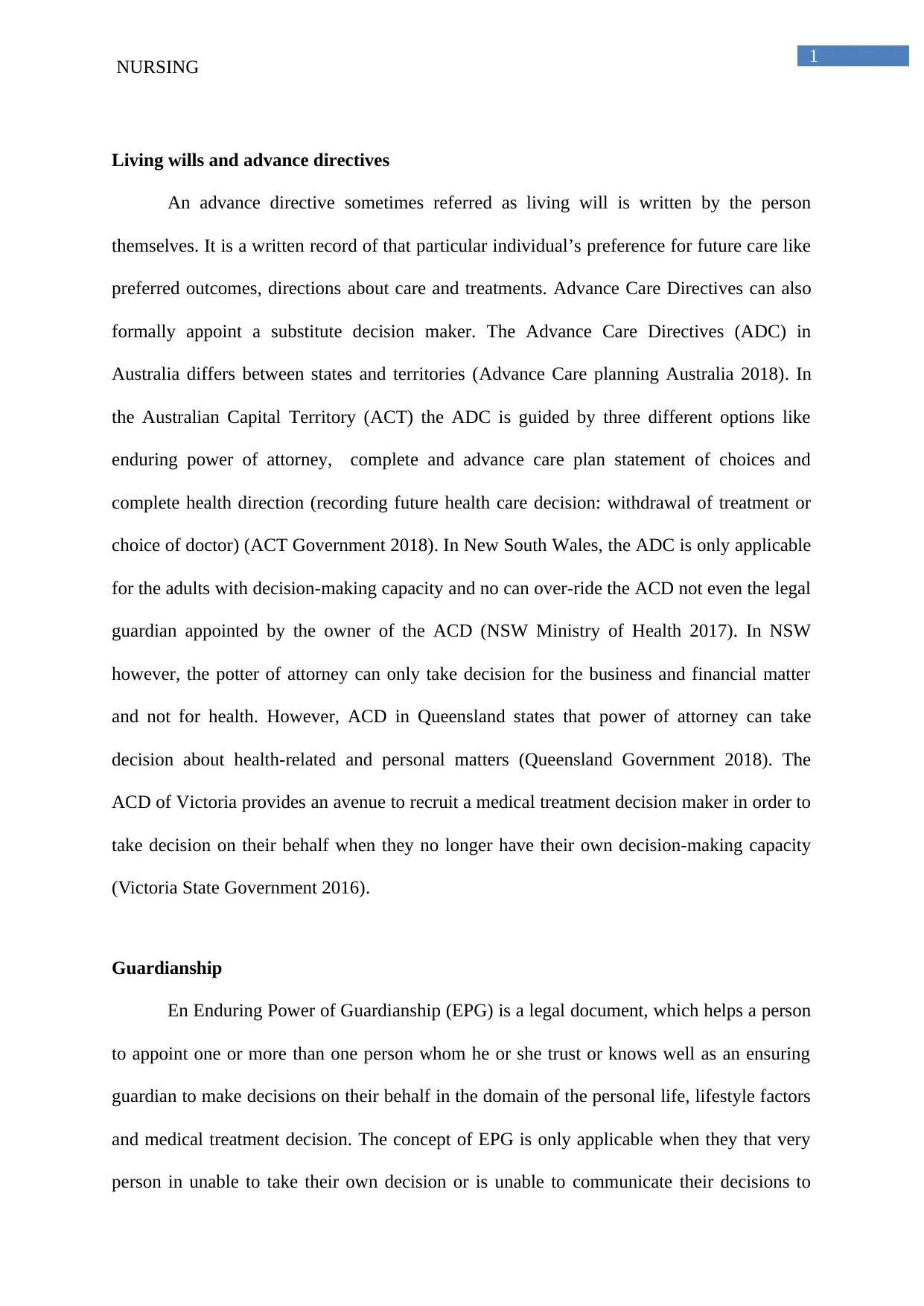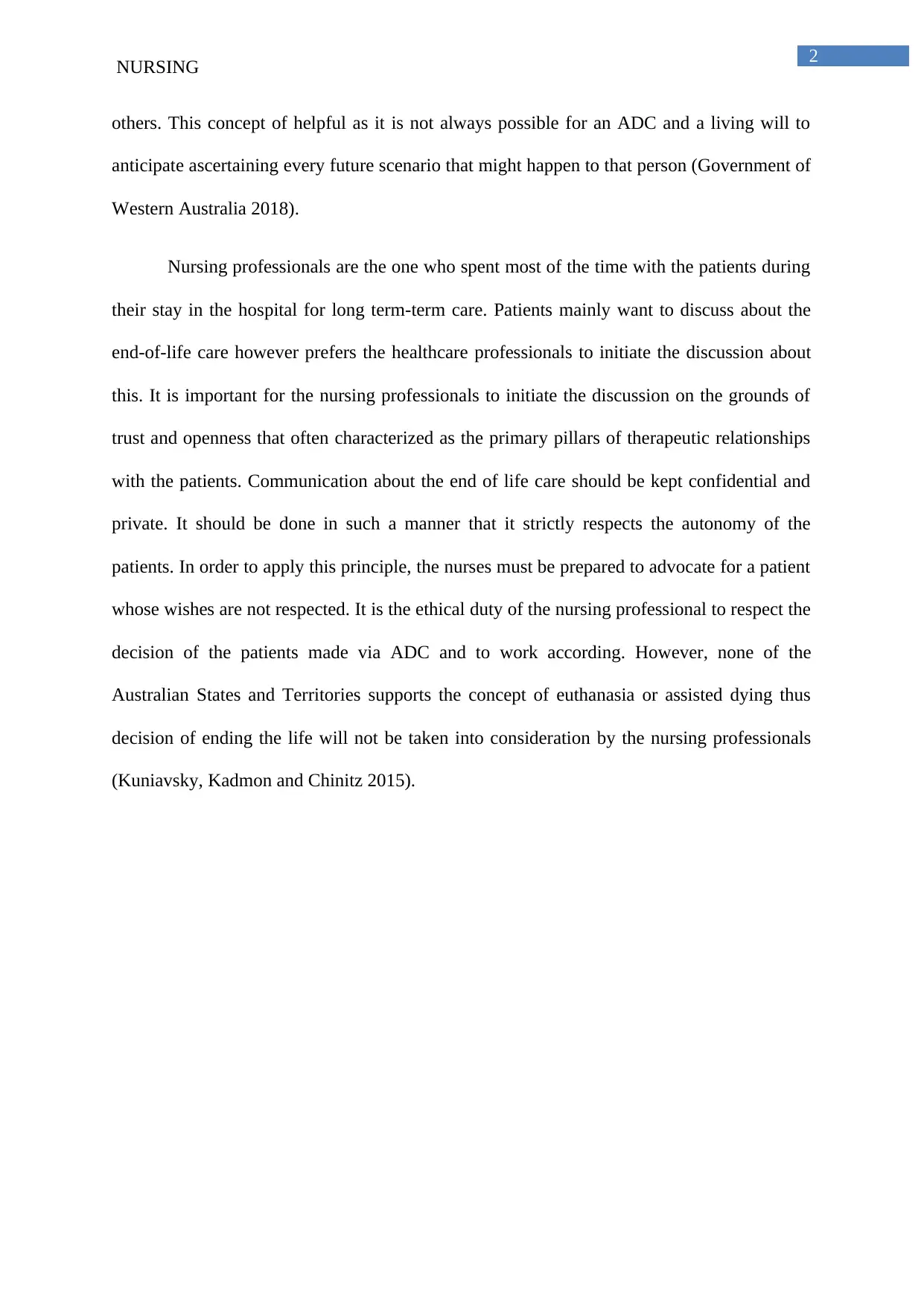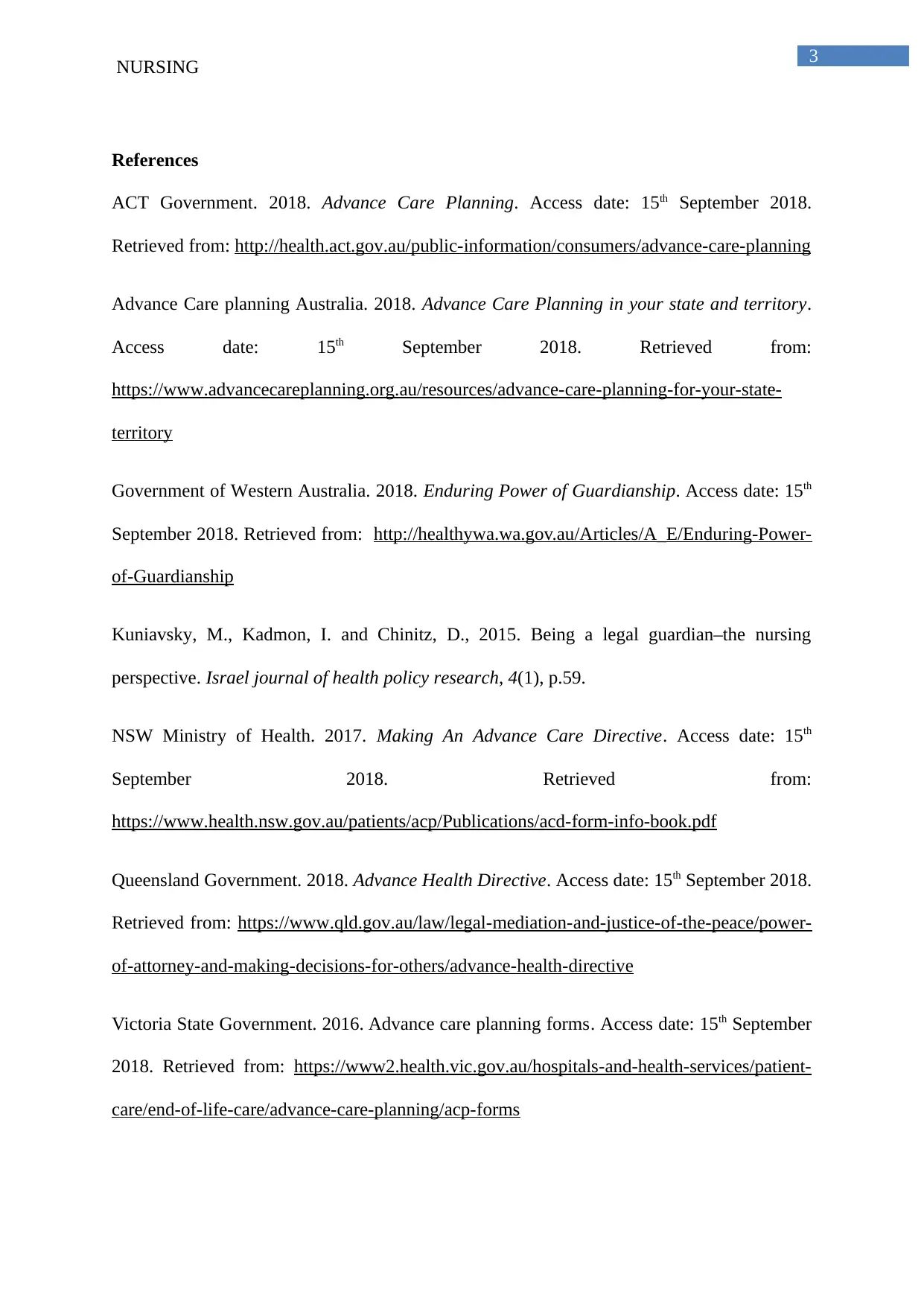Nursing Report: Living Wills, Advance Directives, and Nursing Practice
VerifiedAdded on 2023/06/07
|4
|790
|126
Report
AI Summary
This report examines the legal and ethical considerations surrounding living wills, advance directives, and guardianship within the nursing profession in Australia. It defines advance directives and enduring power of guardianship, highlighting their differences across various states and territories. The report emphasizes the nurse's role in initiating discussions about end-of-life care, respecting patient autonomy, and advocating for patient wishes, while also acknowledging the prohibition of euthanasia or assisted dying in Australia. It underscores the importance of nurses adhering to ethical duties and understanding the legal frameworks governing these crucial aspects of patient care. The report references relevant governmental and health resources to support its analysis.

Running head: NURSING
Nursing
Name of the Student
Name of the University
Author Note
Nursing
Name of the Student
Name of the University
Author Note
Paraphrase This Document
Need a fresh take? Get an instant paraphrase of this document with our AI Paraphraser

1
NURSING
Living wills and advance directives
An advance directive sometimes referred as living will is written by the person
themselves. It is a written record of that particular individual’s preference for future care like
preferred outcomes, directions about care and treatments. Advance Care Directives can also
formally appoint a substitute decision maker. The Advance Care Directives (ADC) in
Australia differs between states and territories (Advance Care planning Australia 2018). In
the Australian Capital Territory (ACT) the ADC is guided by three different options like
enduring power of attorney, complete and advance care plan statement of choices and
complete health direction (recording future health care decision: withdrawal of treatment or
choice of doctor) (ACT Government 2018). In New South Wales, the ADC is only applicable
for the adults with decision-making capacity and no can over-ride the ACD not even the legal
guardian appointed by the owner of the ACD (NSW Ministry of Health 2017). In NSW
however, the potter of attorney can only take decision for the business and financial matter
and not for health. However, ACD in Queensland states that power of attorney can take
decision about health-related and personal matters (Queensland Government 2018). The
ACD of Victoria provides an avenue to recruit a medical treatment decision maker in order to
take decision on their behalf when they no longer have their own decision-making capacity
(Victoria State Government 2016).
Guardianship
En Enduring Power of Guardianship (EPG) is a legal document, which helps a person
to appoint one or more than one person whom he or she trust or knows well as an ensuring
guardian to make decisions on their behalf in the domain of the personal life, lifestyle factors
and medical treatment decision. The concept of EPG is only applicable when they that very
person in unable to take their own decision or is unable to communicate their decisions to
NURSING
Living wills and advance directives
An advance directive sometimes referred as living will is written by the person
themselves. It is a written record of that particular individual’s preference for future care like
preferred outcomes, directions about care and treatments. Advance Care Directives can also
formally appoint a substitute decision maker. The Advance Care Directives (ADC) in
Australia differs between states and territories (Advance Care planning Australia 2018). In
the Australian Capital Territory (ACT) the ADC is guided by three different options like
enduring power of attorney, complete and advance care plan statement of choices and
complete health direction (recording future health care decision: withdrawal of treatment or
choice of doctor) (ACT Government 2018). In New South Wales, the ADC is only applicable
for the adults with decision-making capacity and no can over-ride the ACD not even the legal
guardian appointed by the owner of the ACD (NSW Ministry of Health 2017). In NSW
however, the potter of attorney can only take decision for the business and financial matter
and not for health. However, ACD in Queensland states that power of attorney can take
decision about health-related and personal matters (Queensland Government 2018). The
ACD of Victoria provides an avenue to recruit a medical treatment decision maker in order to
take decision on their behalf when they no longer have their own decision-making capacity
(Victoria State Government 2016).
Guardianship
En Enduring Power of Guardianship (EPG) is a legal document, which helps a person
to appoint one or more than one person whom he or she trust or knows well as an ensuring
guardian to make decisions on their behalf in the domain of the personal life, lifestyle factors
and medical treatment decision. The concept of EPG is only applicable when they that very
person in unable to take their own decision or is unable to communicate their decisions to

2
NURSING
others. This concept of helpful as it is not always possible for an ADC and a living will to
anticipate ascertaining every future scenario that might happen to that person (Government of
Western Australia 2018).
Nursing professionals are the one who spent most of the time with the patients during
their stay in the hospital for long term-term care. Patients mainly want to discuss about the
end-of-life care however prefers the healthcare professionals to initiate the discussion about
this. It is important for the nursing professionals to initiate the discussion on the grounds of
trust and openness that often characterized as the primary pillars of therapeutic relationships
with the patients. Communication about the end of life care should be kept confidential and
private. It should be done in such a manner that it strictly respects the autonomy of the
patients. In order to apply this principle, the nurses must be prepared to advocate for a patient
whose wishes are not respected. It is the ethical duty of the nursing professional to respect the
decision of the patients made via ADC and to work according. However, none of the
Australian States and Territories supports the concept of euthanasia or assisted dying thus
decision of ending the life will not be taken into consideration by the nursing professionals
(Kuniavsky, Kadmon and Chinitz 2015).
NURSING
others. This concept of helpful as it is not always possible for an ADC and a living will to
anticipate ascertaining every future scenario that might happen to that person (Government of
Western Australia 2018).
Nursing professionals are the one who spent most of the time with the patients during
their stay in the hospital for long term-term care. Patients mainly want to discuss about the
end-of-life care however prefers the healthcare professionals to initiate the discussion about
this. It is important for the nursing professionals to initiate the discussion on the grounds of
trust and openness that often characterized as the primary pillars of therapeutic relationships
with the patients. Communication about the end of life care should be kept confidential and
private. It should be done in such a manner that it strictly respects the autonomy of the
patients. In order to apply this principle, the nurses must be prepared to advocate for a patient
whose wishes are not respected. It is the ethical duty of the nursing professional to respect the
decision of the patients made via ADC and to work according. However, none of the
Australian States and Territories supports the concept of euthanasia or assisted dying thus
decision of ending the life will not be taken into consideration by the nursing professionals
(Kuniavsky, Kadmon and Chinitz 2015).
⊘ This is a preview!⊘
Do you want full access?
Subscribe today to unlock all pages.

Trusted by 1+ million students worldwide

3
NURSING
References
ACT Government. 2018. Advance Care Planning. Access date: 15th September 2018.
Retrieved from: http://health.act.gov.au/public-information/consumers/advance-care-planning
Advance Care planning Australia. 2018. Advance Care Planning in your state and territory.
Access date: 15th September 2018. Retrieved from:
https://www.advancecareplanning.org.au/resources/advance-care-planning-for-your-state-
territory
Government of Western Australia. 2018. Enduring Power of Guardianship. Access date: 15th
September 2018. Retrieved from: http://healthywa.wa.gov.au/Articles/A_E/Enduring-Power-
of-Guardianship
Kuniavsky, M., Kadmon, I. and Chinitz, D., 2015. Being a legal guardian–the nursing
perspective. Israel journal of health policy research, 4(1), p.59.
NSW Ministry of Health. 2017. Making An Advance Care Directive. Access date: 15th
September 2018. Retrieved from:
https://www.health.nsw.gov.au/patients/acp/Publications/acd-form-info-book.pdf
Queensland Government. 2018. Advance Health Directive. Access date: 15th September 2018.
Retrieved from: https://www.qld.gov.au/law/legal-mediation-and-justice-of-the-peace/power-
of-attorney-and-making-decisions-for-others/advance-health-directive
Victoria State Government. 2016. Advance care planning forms. Access date: 15th September
2018. Retrieved from: https://www2.health.vic.gov.au/hospitals-and-health-services/patient-
care/end-of-life-care/advance-care-planning/acp-forms
NURSING
References
ACT Government. 2018. Advance Care Planning. Access date: 15th September 2018.
Retrieved from: http://health.act.gov.au/public-information/consumers/advance-care-planning
Advance Care planning Australia. 2018. Advance Care Planning in your state and territory.
Access date: 15th September 2018. Retrieved from:
https://www.advancecareplanning.org.au/resources/advance-care-planning-for-your-state-
territory
Government of Western Australia. 2018. Enduring Power of Guardianship. Access date: 15th
September 2018. Retrieved from: http://healthywa.wa.gov.au/Articles/A_E/Enduring-Power-
of-Guardianship
Kuniavsky, M., Kadmon, I. and Chinitz, D., 2015. Being a legal guardian–the nursing
perspective. Israel journal of health policy research, 4(1), p.59.
NSW Ministry of Health. 2017. Making An Advance Care Directive. Access date: 15th
September 2018. Retrieved from:
https://www.health.nsw.gov.au/patients/acp/Publications/acd-form-info-book.pdf
Queensland Government. 2018. Advance Health Directive. Access date: 15th September 2018.
Retrieved from: https://www.qld.gov.au/law/legal-mediation-and-justice-of-the-peace/power-
of-attorney-and-making-decisions-for-others/advance-health-directive
Victoria State Government. 2016. Advance care planning forms. Access date: 15th September
2018. Retrieved from: https://www2.health.vic.gov.au/hospitals-and-health-services/patient-
care/end-of-life-care/advance-care-planning/acp-forms
1 out of 4
Related Documents
Your All-in-One AI-Powered Toolkit for Academic Success.
+13062052269
info@desklib.com
Available 24*7 on WhatsApp / Email
![[object Object]](/_next/static/media/star-bottom.7253800d.svg)
Unlock your academic potential
Copyright © 2020–2026 A2Z Services. All Rights Reserved. Developed and managed by ZUCOL.





